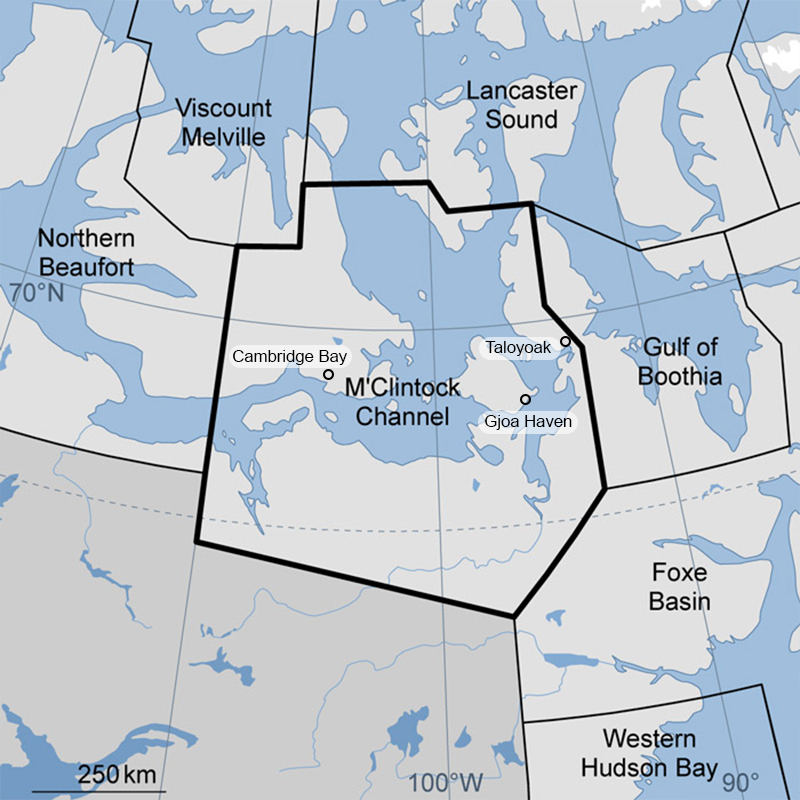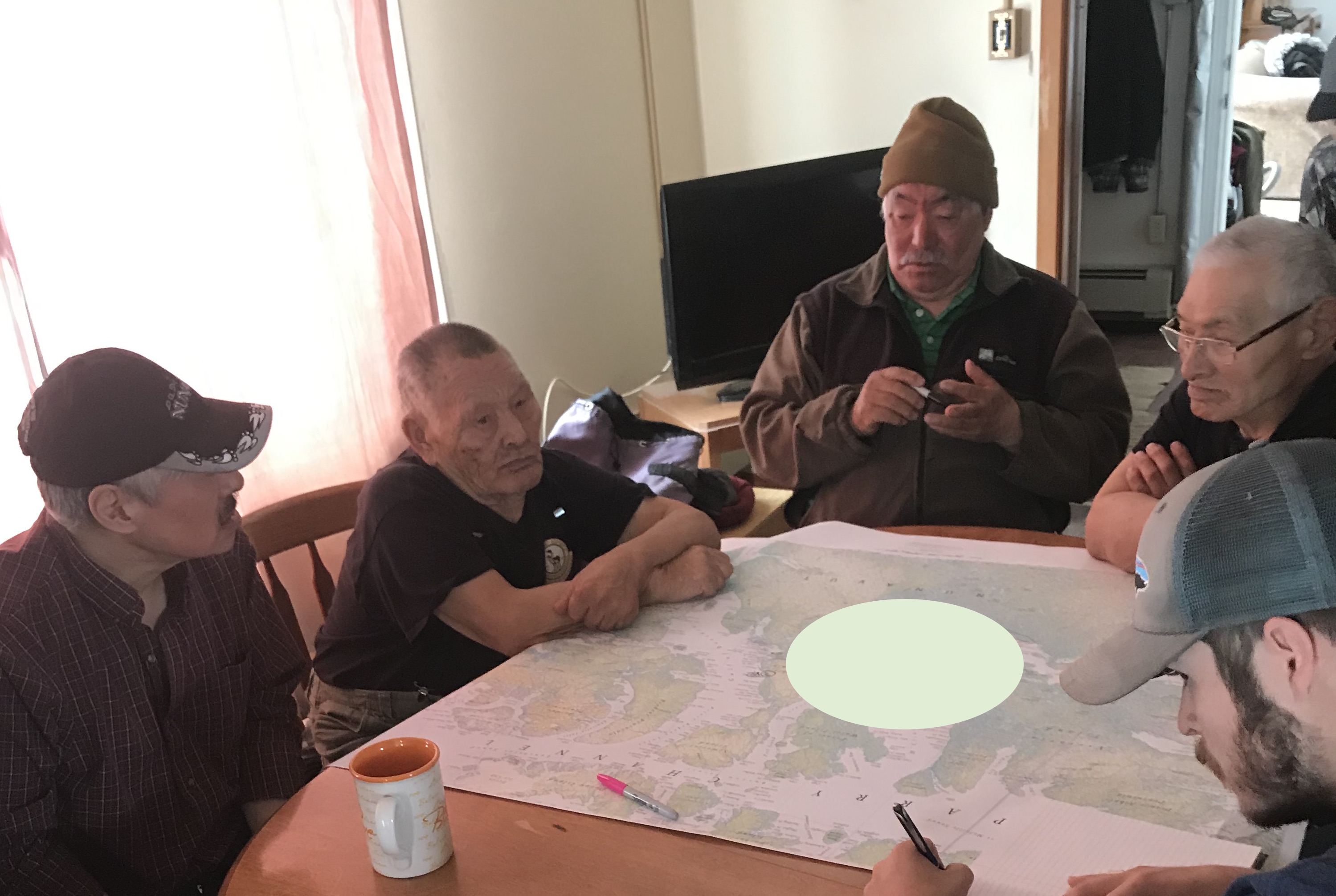Workshops Summer 2019: Difference between revisions
No edit summary |
No edit summary |
||
| (19 intermediate revisions by 2 users not shown) | |||
| Line 1: | Line 1: | ||
This page can be deleted - there are already two other connected versions at play. | |||
The | The M’Clintock Channel (MC) Polar Bear Management Unit (PBMU) used by hunters from Gjoa Haven, Cambridge Bay and Taloyoak (see figure 1), was in 2001 subjected to a three-year polar bear moratorium (a full suspension of hunting). In 2005, the moratorium was lifted and Gjoa Haven and Cambridge Bay signed a Memorandum of Understanding (MOU) with the Nunavut Wildlife Management Board (NWMB) for alternating quotas of one and two tags per year, while Taloyoak did not sign the MOU at all, and therefore did not receive any tags from the MC management unit between 2001 and 2015. No other community in Nunavut or the Northwest Territories has experienced such a (near) moratorium over such an extended period of time. Despite a more recent rise in tags in 2022, these impacts continue to be felt today. Based on a desire for recognition and acknowledgement of the impact of these polar bear quota regulations, two workshops were co-organized in addition to the original <span class="detour link" data-page-title="TEK_workshops" data-section-id="0" data-encounter-type="detour">[[TEK workshops]]</span> that were planned to take place over the summer of 2019, to discuss and document <span class="detour link" data-page-title="Voices_of_Thunder" data-section-id="7" data-encounter-type="detour">[[Voices of Thunder#output| the testimonies of Gjoa Haven hunters and other community members]]</span> | ||
Two BW researchers and an interpreter would ask the pre-designed questions and prompt discussion, while a third BW researcher made notes. Both workshops were audio-recorded. These recordings and workshop notes became the primary materials which were to | [[File:(color) Figure 1 Map of the MC PBMU..jpg|thumb|Map of the M’Clintock Channel Polar Bear Management Unit area (Vongraven and Peacock, 2011). Adapted with permission to include the locations of Gjoa Haven, Cambridge Bay and Taloyoak, who each hunt within this area.]] | ||
[[File:Mapping TEK Gjoa Haven 2019.jpg|thumb|Participants discussing during BearWatch TEK workshop 2019]] | |||
The workshops were advertised over the radio in both English and Inuktitut (Inuit language), and interested individuals signed up through the HTA. One workshop was held May 15, 2019 in the evening with 10 participants and one on May 16 in the morning with 11 participants. These participants comprised mainly older male community members, many of whom had hunted, or still hunt polar bears. There were two female participants in each workshop. Three of the participants were between the ages of 20 and 40, with the remainder older. These two workshops focused specifically on the impacts of polar bear hunting quota reductions on the community. The workshop questions were co-designed by the BW academic researchers and HTA representatives and were asked in both English and Inuktitut to prompt discussion. The format however remained open-ended, meaning that "off-script" discussions were encouraged during the workshop, and occasionally specific members were asked to participate in answering particular questions because of their connection to the issue, as identified in previous interviews or by other community members. Two BW researchers and an interpreter would ask the pre-designed questions and prompt discussion, while a third BW researcher made notes. Both workshops were audio-recorded. | |||
These recordings and workshop notes became the primary materials which were given to me, not long after I joined the BearWatch project. I was requested to describe these experiences and share them with a larger academic audience through academic publishing. This request however presented me with multiple dilemmas. | |||
What to do? | |||
Although you understand that writing “about” other people’s experiences doesn’t exactly sound ethical, you have little time and need to keep going. Your first fieldwork trip to Coral Harbour is upcoming, and you need to prepare for that. Besides, the Gjoa Haven HTA wants a publication, no need to complicate things further. Alternatively you can stay with the trouble and explore in what ways the “Politics of recognition” complicates such writing practices. Maybe you have already leaned into such tensions, and all that is left now, is to organize a conference call and have a conversation with the Gjoa Haven HTA about these complexities. | |||
<span class="Pop-up link" data-page-title=" Politics_of_recognition " data-encounter-type="Stay with the trouble">[[Politics of recognition|Stay with the trouble: The politics of recognition]]</span> | |||
<span class="return link" data-page-title=" Voices_of_Thunder " data-encounter-type="return">[[Voices of Thunder#Ongoing conversations|Return to Cut 1 Voices of Thunder"]]</span> | |||
Latest revision as of 19:45, 24 November 2024
This page can be deleted - there are already two other connected versions at play.
The M’Clintock Channel (MC) Polar Bear Management Unit (PBMU) used by hunters from Gjoa Haven, Cambridge Bay and Taloyoak (see figure 1), was in 2001 subjected to a three-year polar bear moratorium (a full suspension of hunting). In 2005, the moratorium was lifted and Gjoa Haven and Cambridge Bay signed a Memorandum of Understanding (MOU) with the Nunavut Wildlife Management Board (NWMB) for alternating quotas of one and two tags per year, while Taloyoak did not sign the MOU at all, and therefore did not receive any tags from the MC management unit between 2001 and 2015. No other community in Nunavut or the Northwest Territories has experienced such a (near) moratorium over such an extended period of time. Despite a more recent rise in tags in 2022, these impacts continue to be felt today. Based on a desire for recognition and acknowledgement of the impact of these polar bear quota regulations, two workshops were co-organized in addition to the original TEK workshops that were planned to take place over the summer of 2019, to discuss and document the testimonies of Gjoa Haven hunters and other community members


The workshops were advertised over the radio in both English and Inuktitut (Inuit language), and interested individuals signed up through the HTA. One workshop was held May 15, 2019 in the evening with 10 participants and one on May 16 in the morning with 11 participants. These participants comprised mainly older male community members, many of whom had hunted, or still hunt polar bears. There were two female participants in each workshop. Three of the participants were between the ages of 20 and 40, with the remainder older. These two workshops focused specifically on the impacts of polar bear hunting quota reductions on the community. The workshop questions were co-designed by the BW academic researchers and HTA representatives and were asked in both English and Inuktitut to prompt discussion. The format however remained open-ended, meaning that "off-script" discussions were encouraged during the workshop, and occasionally specific members were asked to participate in answering particular questions because of their connection to the issue, as identified in previous interviews or by other community members. Two BW researchers and an interpreter would ask the pre-designed questions and prompt discussion, while a third BW researcher made notes. Both workshops were audio-recorded.
These recordings and workshop notes became the primary materials which were given to me, not long after I joined the BearWatch project. I was requested to describe these experiences and share them with a larger academic audience through academic publishing. This request however presented me with multiple dilemmas.
What to do?
Although you understand that writing “about” other people’s experiences doesn’t exactly sound ethical, you have little time and need to keep going. Your first fieldwork trip to Coral Harbour is upcoming, and you need to prepare for that. Besides, the Gjoa Haven HTA wants a publication, no need to complicate things further. Alternatively you can stay with the trouble and explore in what ways the “Politics of recognition” complicates such writing practices. Maybe you have already leaned into such tensions, and all that is left now, is to organize a conference call and have a conversation with the Gjoa Haven HTA about these complexities.
